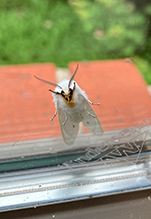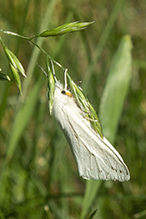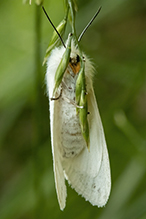agreeable tiger moth
(Spilosoma congrua)
Conservation • Description • Habitat • Ecology • Distribution • Taxonomy
|
|
||||||||||||||||||
Description |
Agreeable tiger moth is a common, medium-sized, tiger moth. It occurs throughout the united States and southern Canada, but is most common east of the Great Plains and is mostly absent from the southwest. In Minnesota it is uncommon in the east and north but absent from the southwestern third of the state. Adults are found between late May and early July in a wide variety of open and forested habitats. Larvae are food generalists, feeding on a wide variety of herbaceous and woody plants, including dandelion, plantain, and pigweed. Adults are ⅝″ to 15⁄16″(15 to 24 mm) in length and have a 1 1⁄16″ to 1⅞″ (27 to 47 mm) wingspan. The head is white. The compound eyes are black and prominent. The antennae on the male are feathery, with extensions along both sides of the shaft (bipectinate). They are wider on males than on females. They are white above. black below. The body is robust. The thorax is densely covered with long white hairs. The abdomen is white without any yellow markings. The wings are pure white. The forewing may be unspotted but usually has postmedial (PM) and subterminal (ST) rows of small black spots, and sometimes a few spots representing the antemedial (AM) and basal lines. The hindwing has a small spot in the discal cell but is otherwise unmarked. The first segment of the front legs (coxa) is yellowish-orange. The third segment (femur) is densely covered with long yellowish-orange hairs above, long white hairs below. The fourth segment (tibia) is densely covered with white hairs. The tibiae on the hind leg has two pairs of spurs, one pair at the tip (apical) and another pair just before the tip (preapical). The last part of the leg (tarsus), corresponding to the foot, is black. |
Size |
Total length: ⅝″ to 15⁄16″(15 to 24 mm) Wingspan: 1 1⁄16″ to 1⅞″ (27 to 47 mm) |
Similar Species |
virginian tiger moth (Spilosoma virginica) abdomen is white with yellow patches and a row of black spots on each side. The forewing is less spotted, with no spots or just a few dark spots. |
Habitat |
A wide variety of open and forested habitats |
Ecology |
Season |
One generation per year in Minnesota All available records from Minnesota are between late May and early July. |
Behavior |
|
Life Cycle |
|
Larva Hosts |
A wide variety of herbaceous and woody plants, including dandelion, plantain, and pigweed. Larva have been reported boring into mushroom stems. |
Adult Food |
|
Distribution |
||
|
Sources Biodiversity occurrence data published by: Minnesota Biodiversity Atlas (accessed through the Minnesota Biodiversity Atlas Portal, bellatlas.umn.edu, 6/24/2024). |
|
| 6/24/2024 | ||
Occurrence |
||
|
||
Taxonomy |
|
Order |
|
Superfamily |
Noctuoidea (Owlet Moths and Allies) |
Family |
Erebidae (Underwing, Tiger, Tussock, and Allied Moths) |
Subfamily |
Arctiinae (Tiger Moths and Allies) |
Tribe |
Arctiini (Tiger Moths) |
Subtribe |
Spilosomina |
Genus |
Spilosoma |
Until recently, tiger moths and lichen moths were treated as a separate family Arctiidae. A recently published monograph (Lafontaine and Schmidt, 2010) contended that the Arctiidae “were more closely related to groups within the Noctuidae than to non-noctuid families.” The Arctiidae were transferred intact to the family Erebidae as a subfamily (Arctiinae). The former subfamilies are now tribes and the former tribes are now subtribes. |
|
Subordinate Taxa |
|
|
|
Synonyms |
|
|
|
Common Names |
|
agreeable tiger moth yellow-legged tiger moth |
|
Glossary
Femur
On insects and arachnids, the third, largest, most robust segment of the leg, coming immediately before the tibia. On humans, the thigh bone.
Tarsus
On insects, the last two to five subdivisions of the leg, attached to the tibia; the foot. On spiders, the last segment of the leg. Plural: tarsi.
Tibia
The fourth segment of an insect leg, after the femur and before the tarsus (foot). The fifth segment of a spider leg or palp. Plural: tibiae.
Visitor Photos |
||
Share your photo of this insect. |
||
This button not working for you? |
||
Michelle F. |
||
 |
|
|
Greg Watson |
||
 |
 |
|
I took the pictures in my backyard in La Crescent, MN yesterday. It was clinging to a grass stem. |
||
MinnesotaSeasons.com Photos |
||
|
||
|
||

Visitor Videos |
||
Share your video of this insect. |
||
This button not working for you? |
||
|
Other Videos |
||
|

Visitor Sightings |
||
Report a sighting of this insect. |
||
This button not working for you? |
||
Michelle F. |
Location: Roseville, MN |
 |
| Greg Watson 6/9/2021 |
Location: La Crescent, MN. I took the pictures in my backyard in La Crescent, MN yesterday. It was clinging to a grass stem. |
MinnesotaSeasons.com Sightings |
||
|

Created: 7/14/2021 Last Updated: © MinnesotaSeasons.com. All rights reserved. |



